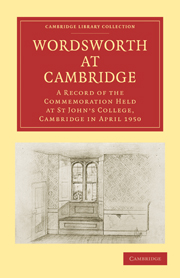 Wordsworth at Cambridge
Wordsworth at Cambridge Book contents
- Frontmatter
- Contents
- FRONTISPIECE
- The Wordsworth Centenary Celebrations
- The Master's Address: St John's College in Wordsworth's Time
- Reading and Commentary
- The Toast: “Wordsworth”, by the Master of Trinity College
- The Exhibition in the Library
- Additional Notes on St John's College in Wordsworth's Time
- Wordsworth's Ash Tree
- Wordsworth Portraits: A Biographical Catalogue
- ILLUSTRATIONS
The Master's Address: St John's College in Wordsworth's Time
from The Wordsworth Centenary Celebrations
Published online by Cambridge University Press: 07 September 2010
- Frontmatter
- Contents
- FRONTISPIECE
- The Wordsworth Centenary Celebrations
- The Master's Address: St John's College in Wordsworth's Time
- Reading and Commentary
- The Toast: “Wordsworth”, by the Master of Trinity College
- The Exhibition in the Library
- Additional Notes on St John's College in Wordsworth's Time
- Wordsworth's Ash Tree
- Wordsworth Portraits: A Biographical Catalogue
- ILLUSTRATIONS
Summary
It was the 30th October 1787 when, with his uncle, William Cookson, and his cousin, John Myers, Wordsworth arrived in Cambridge. Crossing the old Bridge, they alighted at the Hoop Hotel, where King and Harper's garage now stands. Cambridge was at the time a small country town, not yet 10,000 in population. The streets were unpaved and unlighted and gutters ran down the middle of them. The University numbered about 800 and the relations between Town and Gown were extremely hostile.
Wordsworth chose St John's because his uncle was at the time a Fellow of the College and a friend of one of the tutors. The Reverend William Cookson had been Preceptor to three of the King's sons and was a man of some influence. He wished to help the young Wordsworths who were orphans and in financial difficulty. William, he trusted, would win a fellowship at College and take orders and thus be provided for.
Through most of the eighteenth century St John's had been the largest College in the University, but Trinity was now gaining the lead in numbers and academical honours. St John's had the character of the Tory College in the Whig University. Its reputation had been much increased by the vigorous policy of Dr William Powell, Master from 1765 to 1775, who had raised the educational standard and given much attention to the grounds and buildings.
- Type
- Chapter
- Information
- Wordsworth at CambridgeA Record of the Commemoration Held at St John's College, Cambridge in April 1950, pp. 2 - 11Publisher: Cambridge University PressPrint publication year: 2009First published in: 1950


